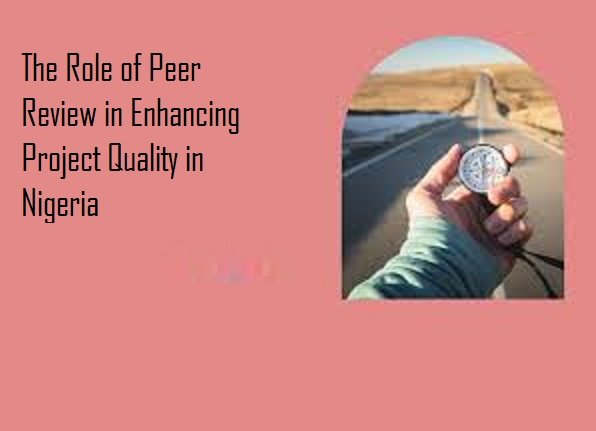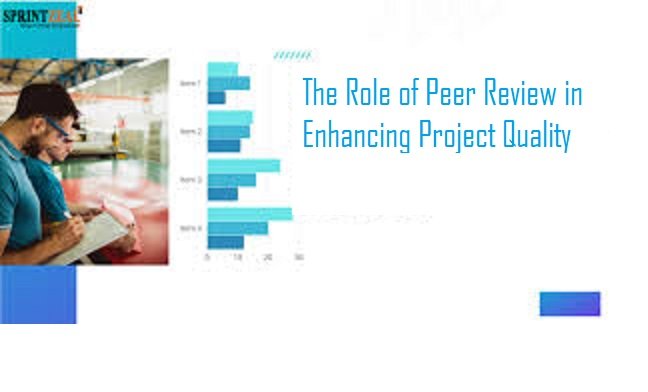- June 11, 2024
- Posted by: Igbaji Chinwendu
- Category: Project Writing Guide

The Role of Peer Review in Enhancing Project Quality in Nigeria
Contents
Introduction
The quality of a project is a critical pointer to the validity and level of compliance with the academic standards. Academic writing plays a crucial role in the creation of knowledge, intellectual development, and national advancement in Nigeria’s educational system.
It includes a range of academic writing styles, such as essays, dissertations, research papers, and academic articles. Nigeria’s academic writing scene is shaped by linguistic, cultural, and educational elements, which reflect the dynamic and varied character of the nation’s educational system.
In the Nigerian educational sector, academic writing is crucial for promoting critical thinking, knowledge sharing, and academic excellence. Moreover, academic writing fosters analytical thinking, good communication techniques, and the capacity to build strong arguments supported by facts and research.

Factors Affecting Project Quality in Nigeria
The creation and execution of projects are at the core of academic writing. Many factors, such as unclear goals and specifications, poor planning and budgeting, poor project management, a lack of resources and expertise, linguistic and cultural barriers, political and regulatory issues, and technological difficulties, all have an impact on the quality of projects in Nigeria.
It is crucial to address these problems and create plans to lessen their effects in order to guarantee the successful completion of the project.
Concept and Function of Peer Review
Peer review is an essential step in the scientific research process because it enables researchers to assess their peers’ work for quality, validity, and relevance prior to publication.
Peer review serves to guarantee that research is reliable, thorough, and pertinent to the subject while also giving writers input on how to make their work better. Peer reviews perform essential roles in peer review such as verifying the quality of published research, validating research findings, illustrating the significance of studies, and offering insightful comments to writers on their creative work.
Pros and Cons of peer reviews
|
Pros |
Cons |
|
Peer review is one kind of quality control that makes sure research is high calibre and adheres to the norms of the field. This supports the preservation of the research’s credibility and integrity. |
The peer review procedure may be time-consuming because reviewers must thoroughly assess the research and offer insightful commentary. |
|
As subject-matter specialists, peer reviewers’ comments might offer insightful analysis and helpful recommendations for advancement. |
Due to the possibility of reviewers’ own prejudices and points of view entering the rating process, peer review is not necessarily impartial. |
|
Peer review confirms that the study has undergone a comprehensive evaluation by subject matter experts. |
Since reviewers’ identities may not be revealed and they may stay anonymous, the peer review process is not always transparent. |
|
Peer review can help research become more readable and clearer by suggesting modifications to the writing style or structure that will make the work more understandable to a larger audience. |
Researchers who are highly regarded or well-established in their subject may be given favouritism in peer review. |
Role of peer review in enhancing project quality in Nigeria
In Nigeria, peer review is essential to raising the calibre of projects. Peer review has the potential to greatly enhance project quality in Nigeria through a number of approaches that are outlined below:
- Ensuring Validity and Accuracy: Ensuring the validity and accuracy of projects in Nigeria is one of peer review’s main responsibilities. Peer review allows for the identification and correction of any potential flaws, biases, or inaccuracies in projects. This procedure is especially crucial in domains like scientific research, where the reliability of results is crucial.
- Increasing Credibility: In Nigeria, peer review also helps projects gain greater credibility. A project has greater credibility and reliability when it has undergone thorough peer review. This finds substantial application in the educational sector where there is a premium on peer-reviewed publications.
- Improving Methodology and Approach: Projects in Nigeria can gain from enhanced methodology and approaches through peer review. Peers might offer insightful criticism on the techniques employed, pointing out possible drawbacks or offering other strategies. The project quality may be improved and refined as a result of this iterative approach.
- Finding Improvement Opportunities: Peer review is a tool for finding project improvement opportunities. Peers can provide helpful critiques and recommendations for raising a project’s general calibre. Excellence and ongoing progress depend on this feedback loop.
- Quality Assurance: Peer review is used in Nigeria to ensure the quality of projects in a variety of fields. Peer review guarantees that initiatives in engineering, research, or other domains achieve high standards and follow best practices.
- Knowledge Sharing and Collaboration: In Nigeria, peer review encourages professionals to share and collaborate on knowledge. Experts can interact, share best practices, and further one another’s careers through this opportunity to exchange ideas. The overall quality of the product is enhanced by this collaborative element.
Conclusion
This article has highlighted the important role that peer reviews play in actualization of efficient and quality projects. Peer evaluations are important in Nigeria because of a number of factors, including the wide range of projects being carried out in different industries.
In addition, these reviews also have a major influence on the quality of projects in Nigeria because they foster regulatory compliance, risk mitigation, greater credibility, information sharing, capacity building, and quality assurance. In Nigeria, a number of industries stand to gain from adopting peer review procedures as a core component of project management.
